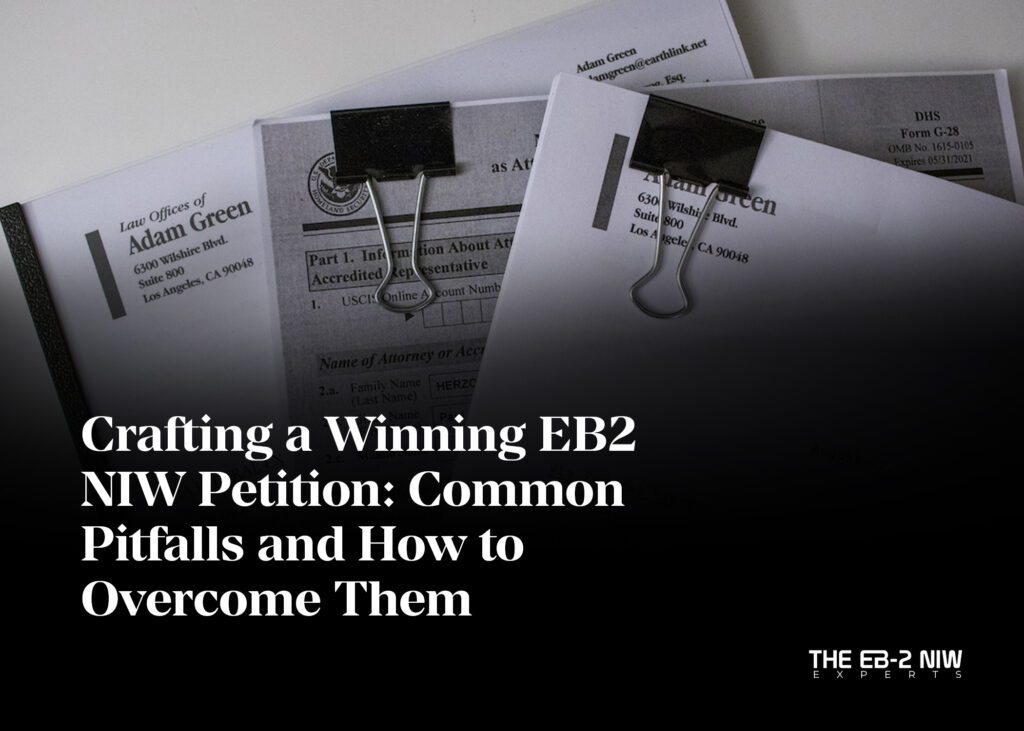The EB2 National Interest Waiver (NIW) is a highly sought-after immigration pathway for professionals who can demonstrate that their work significantly benefits the United States. Unlike the traditional EB2 process, the NIW waives the labor certification requirement, making it an attractive option for self-petitioners. However, securing approval for an EB2 NIW petition requires meticulous preparation, and even minor mistakes can lead to denials or requests for evidence (RFEs). This guide highlights common pitfalls in the EB2 NIW petition process and offers solutions to overcome them.
1. Failing to Establish Substantial Merit and National Importance
One of the key criteria for an EB2 NIW petition is proving that the applicant’s work has substantial merit and national importance. Many applicants fall short in clearly articulating the broader impact of their contributions.
How to Overcome This Pitfall
- Provide detailed evidence demonstrating the national and industry-wide impact of your work.
- Use strong recommendation letters from experts who can attest to the significance of your contributions.
- Reference relevant data, reports, or government publications that highlight the national importance of your field.
For professional guidance on how to craft a compelling petition, check out our services to maximize your chances of success.
2. Weak Letters of Recommendation
Letters of recommendation play a critical role in an EB2 NIW petition. Weak, generic, or poorly written letters can diminish the strength of an application.
How to Overcome This Pitfall
- Secure letters from independent experts in your field, not just your colleagues or supervisors.
- Ensure the letters contain specific details about your contributions, their impact, and why your work is in the national interest.
- Use data and concrete examples to substantiate the claims in the letters.
If you need assistance in obtaining high-quality letters, our experts can help craft persuasive recommendations tailored to your case.
3. Inadequate Documentation of Past Achievements
Many applicants assume that their qualifications alone are sufficient. However, USCIS requires tangible evidence of past accomplishments to assess whether an applicant will continue contributing to the national interest.
How to Overcome This Pitfall
- Provide a well-organized portfolio with published research, media mentions, patents, conference presentations, and other relevant achievements.
- Include impact metrics such as citations, awards, or industry recognition to demonstrate your influence.
- Supplement your petition with third-party validation of your contributions.
For the latest updates on USCIS requirements, visit the USCIS newsroom.
4. Failing to Prove That the Applicant Is Well-Positioned to Advance Their Work
A common reason for EB2 NIW denials is the failure to prove that the petitioner is well-positioned to advance their proposed endeavor.
How to Overcome This Pitfall
- Highlight your relevant qualifications, professional experience, and unique skill set.
- Include evidence of past successes and their direct relevance to your future plans.
- Provide letters from industry leaders who can validate your ability to continue making an impact.
Need help structuring a strong argument? Visit our blog for more insights.
5. Inconsistencies in Petition Documents
Discrepancies or inconsistencies in supporting documents can lead to RFEs or outright denial.
How to Overcome This Pitfall
- Carefully review all submitted documents to ensure consistency in names, dates, and details.
- Work with an experienced consultant or attorney to verify that your petition is error-free.
- Cross-check your statements with supporting evidence to maintain a cohesive narrative.
If you’re unsure about any aspect of your petition, reach out to our experts for personalized assistance.
6. Neglecting to Address USCIS’s Three-Prong Test Properly
To qualify for an EB2 NIW, an applicant must satisfy the three-prong test outlined in the Matter of Dhanasar decision:
- The work must have substantial merit and national importance.
- The applicant must be well-positioned to advance their work.
- Waiving the labor certification must benefit the United States.
How to Overcome This Pitfall
- Clearly address each prong in a structured, compelling manner.
- Support your arguments with strong evidence, including expert testimonies and industry data.
- Align your petition with USCIS guidelines to ensure a smooth review process.
Final Thoughts
A well-prepared EB2 NIW petition requires careful planning, strong evidence, and a compelling argument demonstrating your value to the United States. Avoiding common pitfalls can significantly increase your chances of approval.
If you need expert assistance in navigating the complexities of the EB2 NIW process, explore our services or contact us here. Our team of professionals is ready to help you craft a winning petition.
For more valuable insights, visit our blog and stay updated with the latest USCIS news here.


